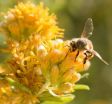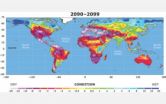(Press-News.org) A study published Oct. 19 in the open access journal Public Library of Science (PLoS) ONE, shows that not just human memories fade. Scientists from Arizona State University and the Norwegian University of Life Sciences examined how aging impacts the ability of honey bees to find their way home.
While bees are typically impressive navigators, able to wend their way home through complex landscapes after visits to flowers far removed from their nests, the study reveals that aging impairs the bees' ability to extinguish the memory of an unsuitable nest site even after the colony has settled in a new home.
"From previous studies, we knew that old bees are characterized by poor learning when trained to floral odors in the laboratory," says Gro Amdam, an associate professor in the School of Life Sciences in ASU's College of Liberal Arts and Sciences. "So, we wanted to test whether aging also affects learning behavior that is important for a bee's survival in the wild."
A bee is very well-trained as a forager after three to four days of flight time, Amdam says. Whereas mature bees have piloted their way to and from the hive for five to 11 days and old bees have had more than two weeks of flight time.
To test how old bees adapt to a changed home location, researchers trained bees to a new nest box while their former nest was closed off. Groups composed of mature and old bees were given several days in which to learn the new home location and to extinguish the bees' memory of their unusable former nest box.
The scientists then disassembled the bees' new home and forced groups of mixed-age bees to choose between three alternative nest locations, including the former nest box. Old bees with symptoms of senescence preferentially oriented toward the former nest site, despite the experience that should have told them that it was unusable.
"Although many old bees fail in learning tasks, we also discovered that a few still perform with excellence," explains Daniel Münch, lead author of the study and a senior life sciences researcher in Norway.
The scientists believe that their findings with bees offer a new means to model and understand the variability found in brain function between individuals; where some individuals' memories remain intact, while others' learning behavior becomes inflexible with age.
INFORMATION:
Old bees' memory fades; mirrors recall of mammals
2010-10-20
ELSE PRESS RELEASES FROM THIS DATE:
Drought may threaten much of globe within decades
2010-10-20
The United States and many other heavily populated countries face a growing threat of severe and prolonged drought in coming decades, according to results of a new study by National Center for Atmospheric Research (NCAR) scientist Aiguo Dai.
The detailed analysis concludes that warming temperatures associated with climate change will likely create increasingly dry conditions across much of the globe in the next 30 years.
The drought may reach a scale in some regions by the end of the century that has rarely, if ever, been observed in modern times.
Using an ensemble ...
Study reveals superior sedation method for children
2010-10-20
Procedural sedation and analgesia is an essential element of care for children requiring painful procedures in the emergency department. The practice of combining ketamine and propofol, two common medications used in emergency departments, has become more popular. However, until recently, it was unclear whether this practice was superior to the use of either agent alone, especially in children.
Research led by Drs. Amit Shah, Gregory Mosdossy and Michael Rieder of the Schulich School of Medicine & Dentistry at The University of Western Ontario and Lawson Health Research ...
Iowa State, USDA researchers discover eye test for neurological diseases in livestock
2010-10-20
AMES, Iowa – The eyes of sheep infected with scrapie – a neurological disorder similar to mad cow disease – return an intense, almost-white glow when they're hit with blue excitation light, according to a research project led by Iowa State University's Jacob Petrich.
The findings suggest technologies and techniques can be developed to quickly and noninvasively test for transmissible spongiform encephalopathies, progressive and fatal neurological diseases such as mad cow disease in cattle and Creutzfeldt-Jakob disease in humans. Petrich, in fact, is working to develop ...
Old logging practices linked to high erosion rates
2010-10-20
Clear-cut logging and related road-building in the 1950s and 1960s in southern Oregon's Siskiyou Mountains disrupted soil stability and led to unprecedented soil erosion made worse during heavy rainstorms, report University of Oregon researchers.
While logging practices have improved dramatically since then, the damaged landscape -- the removal of low vegetation that helps to protect hillsides during fires and rain -- continues to pose a threat into the foreseeable future, said Daniel G. Gavin, professor of geography, and postdoctoral doctoral researcher Daniele Colombaroli.
Their ...
The hair brush that reads your mind
2010-10-20
WASHINGTON, Oct. 19 – One of the main techniques for measuring and monitoring mental activity, called functional near infrared spectroscopy (fNIRS), can often be impaired because a person's hair gets in the way. But now, thanks to a team of researchers at the University of Texas at Dallas and the University of Texas at Arlington, a novel device called a "brush optrode" is providing increased sensitivity with fiber tips designed to thread through hair to enhance scalp contact.
Details of the device will be presented at the Optical Society's (OSA) 94th annual meeting, ...
Researchers advocate for more education and attention regarding rare breast cancer
2010-10-20
PHILADELPHIA (October 19, 2010)—Inflammatory breast cancer (IBC), an aggressive and rare malignancy, is often initially misdiagnosed as an infection or rash. However, getting the correct diagnosis quickly is critical for patients because the disease spreads beyond the breast in a matter of just days or weeks. With that in mind, leading specialists from The University of Texas MD Anderson Cancer Center and Fox Chase Cancer Center have written a review of the current scientific and medical understanding of IBC, which includes key information on diagnosis, imaging, treatment, ...
ORNL's research reactor revamps veteran neutron scattering tool
2010-10-20
OAK RIDGE, Tenn., Oct. 19, 2010 -- The Cold Triple Axis spectrometer, a new addition to Oak Ridge National Laboratory's High Flux Isotope Reactor and a complementary tool to other neutron scattering instruments at ORNL, has entered its commissioning phase.
The CTAX uses "cold" neutrons from the HFIR cold source to study low-energy magnetic excitations in materials. Cold neutrons are slower than their "thermal" neutron counterparts, and thus perfect for probing low-energy dynamics.
The instrument, which moves by way of air pads on an epoxy surface known as the "dance ...
Study: Religious diversity increases in America, yet perceptions of Christian nation intensify
2010-10-20
WEST LAFAYETTE, Ind. - While America continues to become more religiously diverse, the belief that America is a Christian nation is growing more intense, according to research from Purdue University.
"America is still predominantly Christian, but it is more diverse than ever," said Jeremy Brooke Straughn, an assistant professor of sociology who studies national identity. "At the same time, many people feel even more strongly that America is a Christian country than they did before the turn of the century. This is especially true for Americans who say they are Christians ...
WSU and ASU professors urge one-way Martian colonization missions
2010-10-20
PULLMAN, Wash. - For the chance to watch the sun rise over Olympus Mons, or maybe take a stroll across the vast plains of the Vastitas Borealis, would you sign on for a one-way flight to Mars?
It's a question that gives pause to even Dirk Schulze-Makuch, a Washington State University associate professor, who, with colleague Paul Davies, a physicist and cosmologist from Arizona State University, argues for precisely such a one-way manned mission to Mars in an article published this month in the "Journal of Cosmology."
In the article, "To Boldly Go: A One-Way Human Mission ...
10-minute plasma treatment improves organic memory performance
2010-10-20
Washington, D.C. (October 19, 2010) -- In its current early stage of development, digital memory circuits that use organic elements instead of silicon or other inorganic materials have a seemingly endless list of variables and options to consider, test, and optimize. While organic electronics are immediately attractive for their potential for extremely low cost and flexible substrates, many design aspects that are now taken for granted in the mature silicon-circuit world must be examined anew from the ground up.
A group led by Takhee Lee from Korea's Gwangju Institute ...



